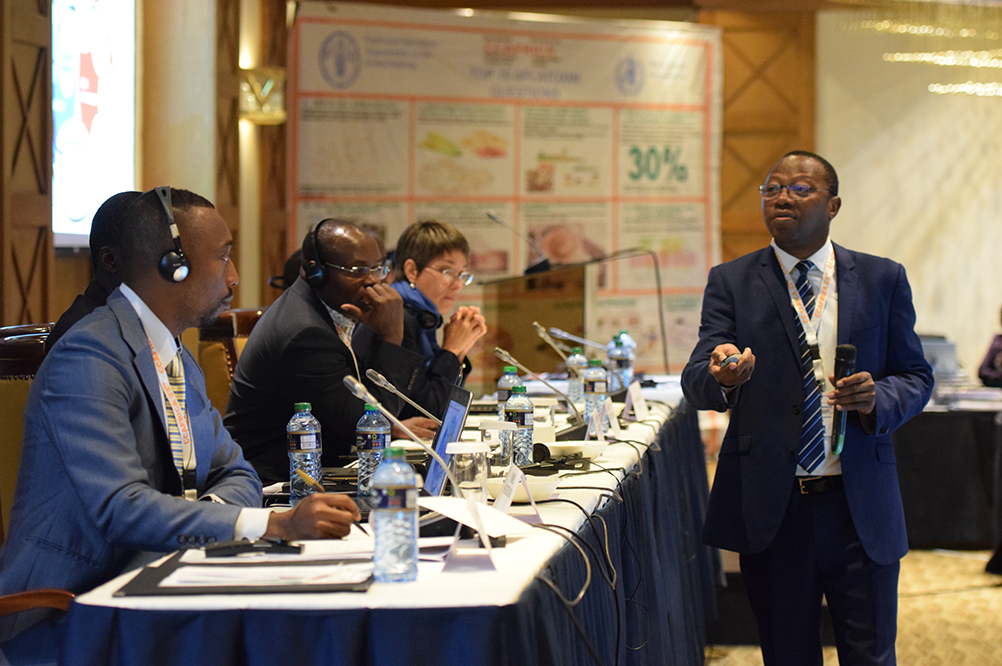The CCAFRICA Region - Regional Coordinator Uganda
The ‘Coordinating Committee for Africa’ was established by the Codex Alimentarius Commission in 1972 with a mandate to “exercise general coordination in the preparation of standards relating to the region of Africa”. The committee held its first meeting at FAO in 1974, with 19 countries in attendance.
As the new regional coordinator begins their term, the Agreement of the African Continental Free Trade Area (AfCFTA), which came into effect in May 2020, has reinforced the need for an efficient and effective system for managing sanitary and phytosanitary measures, in particular food safety, across the continent as its borders open for trade.
The regional coordinator is based in the Uganda National Bureau of Standards, a statutory body under the Ministry of Trade, Industry and Co-operatives which oversees, as part of its mandate, the promotion and use of standards.
As regional coordinator, Uganda intends to engage closely with countries via surveys, webinars and workshops to identify needs and emerging issues, create awareness of priority food safety issues and of Codex standards. A pilot study will also explore the food safety situation in broader terms across the region. By strengthening engagement with regional bodies such as the African Union, the African Organisation for Standardisation and the African Continental Free Trade Area Secretariat, Uganda also aims to enhance advocacy work in the region.
CCAFRICA Coordinator
All information on Codex is public and free.
For regional enquiries contact:
CCAFRICA Secretariat
Uganda National Bureau of Standards Plot 2 - 12, Bypass Link, Industrial
& Business park, Kyaliwajala road,
P.O Box 6329 Kampala, Uganda
Tel: +256 (041) 7333250 / 0417333251 / 0417333252
Email: [email protected]
Web: www.unbs.go.ug
Large scale FAO Total Diet Study successfully assesses chemical residue contamination in food in Benin, Cameroon, Mali and Nigeria
FAO Food Safety and Quality Officers reported at CCAFRICA23 on a Total Diet Study (TDS) that for the first time covered a wide geographical area and examined a high number of chemical contaminants including mycotoxins, dioxins, pesticides, and heavy metals.
A TDS is an instrument to assess the dietary exposure of populations to specific chemical contaminants. They analyze food cooked and prepared as it would be by the consumer and are representative of the foods eaten by a particular local population. They are complementary to other monitoring and surveillance programmes that measure contamination of specific commodities of food products at one-step of the chain and are generally designed to assess compliance with regulatory limits.

Samples transported in cool boxes to the lab for analysis
Assessing impact on public health
Blaise Ouattara, Food Safety and Quality Officer in the Regional Office for Africa, said “Total Diet Studies are very useful to assess potential impact on public health”. Catherine Bessy, Food Safety and Quality Officer based in FAO headquarters in Rome added: “This project allowed four countries to undertake risk assessments for a list of chemical contaminants and this is the basis for taking sound action by national authorities”.

Blaise Ouattara and representatives from Benin, Cameroon, Mali and Nigeria (CCAFRICA23, Nairobi, Kenya)
“The next step for us is integrate the major contaminants from the study in the development of sampling plans of the Benin Food Safety Authority”, said Alexis Tossougbo, Benin one of the participating countries. Daniel Fotio from Cameroun said: “We will integrate issues identified in the TDS into the strategic plan 2020-2025 of the Central African Inter-States Pesticides' Committee.
Two studies for each of the four countries of the sub-Sahara region were designed and implemented to reflect different consumption patterns that can vary to a great extent within the same country, depending on agro-ecological conditions and social factors.
Reducing risk
Abimbola Adegboye from Nigeria said: “The way forward for us is to continue building sustainably on the stakeholders' recommendations and implement specific regulatory interventions to mitigate the identified priority risks”. Mahmoud Camara from Mali said it would be a priority to raise awareness amongst smoked fish producers “to address the concern of pesticide residue detected by the TDS”.
The project ran from September 2014 to December 2018. It was funded by the STDF and was implemented by FAO and the Centre Pasteur du Cameroun, in technical collaboration with WHO. In countries, partners in the design and implementation of the project included Agence Béninoise de Sécurité Sanitaire des Aliments (ABSSA) in Benin, Centre Pasteur of Cameroon, the Agence Nationale de la Sécurité sanitaire des aliments in Mali, and the Nigeria Food and Drug Authority.
Read more
Joint guidance on TDS by EFSA, FAO and WHO
Results: Polycyclic aromatic hydrocarbons in foods
Results: Pesticides occurrence in foods








Leave a comment